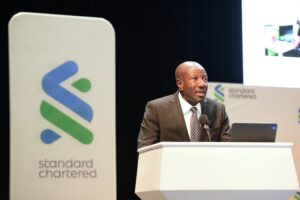- 16% rise in operating income
- digital transformation drives success with 95% increase in digital client acquisition
Standard Chartered Bank (StanChart) Chief Executive Officer, Mansa Nettey, has said that during this 2022 financial year the bank grew its operating income by 16 percent – increasing it from GH¢1.05billion to GH¢1.21billion.
The figure aligns with the lender’s 5-year growth trend, serving as a testament to the bank’s underlying health as evidenced by its robust balance sheet and strong liquidity position at the end of the period, she added.
Addressing shareholders at the 53rd Annual General Meeting (AGM), the CEO highlighted how StanChart took proactive measures as early as mid-2022 when they noticed signs of strain in key drivers of domestic growth. This proactive approach, she noted, enabled the bank to maintain resilience amid challenges in the macroeconomy and ensure their strategies were well-aligned with the economic outlook.

“In 2022, management remained laser-focused on monitoring developments within the macroeconomy and ensuring that the country’s strategies remained relevant… We proactively engaged our clients and offered customised support aligned with their needs and ambitions,” she added.
During the year, the bank saw a significant increase in digital client acquisition – with 95 percent of new clients coming from digital channels as a direct result of the investments they continue to make in digital. They also made significant improvements to provide a smooth and efficient client experience, resulting in over 90 percent of service requests being received through digital channels.
Year in review
One of the key factors contributing to the aforementioned growth in income was a substantial increase in net interest income, which rose by 29 percent from GH¢627.5million to GH¢807.8million. This improvement was attributed to better net interest margins as well as increased volumes. Additionally, net customer loans saw a 9 percent year-on-year growth, rising from GH¢1.9billion to GH¢2.1billion primarily due to an increase in term and trade loans.
Customer deposits also witnessed positive growth, increasing by 8 percent from GH¢7.6billion to GH¢ 8.2billion. This rise was driven by consistent growth in retail deposits, higher inflows from transaction banking clients, a build-up in custody deposits, and the impact of depreciation on foreign currency deposits.
However, despite these positive developments, the bank faced challenges stemming from the external environment and Domestic Debt Exchange Programme (DDEP), which saw Standard Chartered post an overall impairment of GH¢1.2billion. This represented a significant increase from the prior year’s recovery of GH¢5.9million.
Consequently, the bank recorded a post-tax loss of GH¢297.8million for the period, compared to the GH¢436.9million after-tax profit in 2021.
Despite these, the bank’s Capital Adequacy Ratio (CAR) remained strong at 23 percent; significantly above the regulatory minimum of 10 percent. However, this was below the 33 percent recorded in 2021. Excluding effects of the regulatory forbearance for CAR on the back of the DDEP, the ratio remained at 19 percent.
Similarly, asset quality – as measured by the Non-Performing Loan (NPL) ratio on a gross basis, saw substantial improvement; dropping from 24 percent in 2021 to 12 percent in 2022, the lowest in the last five years. This improvement indicates positive steps taken by the bank to address its asset quality issues.
A review of the various business segments showed that the Corporate, Commercial & Institutional Banking (CCIB) segment closed the year with revenues of GH¢831million, marking an improvement from the GH¢733million recorded in 2021; meanwhile, the Consumer, Private and Business Banking space witnessed an 18 percent rise, surging from GH¢318million to GH¢376million, that was attributed to increasing revenue from ‘capital-lite’ products.
Looking ahead
Chairman of the Board, Ebenezer Twum Asante expressed strong confidence in the early financial figures for 2023, indicating stability and moderate growth for the rest of the year. He maintained that the bank will continue to prioritise its enhanced corporate governance framework, recognising its critical role in successfully navigating the upcoming period.
“We are well-equipped to navigate these challenging times. We have a robust business
model and a clear strategy. We will continue to focus on opportunities that exist within our redefined risk appetite while taking advantage of technology to open new opportunities,” he noted.










